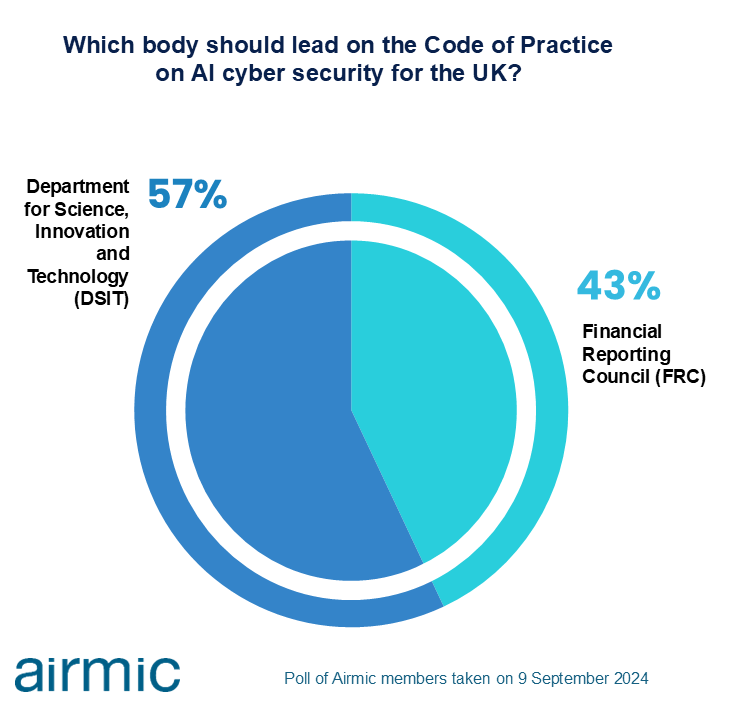NO CONSENSUS ON WHICH UK BODY SHOULD LEAD ON AI CODE
No consensus emerged in this week’s Airmic Big Question as to which body in the UK should lead on a proposed Code of Practice on Artificial Intelligence (AI) cyber security, with respondents divided between having the Department for Science, Innovation and Technology (DSIT) (57%) and the Financial Reporting Council (FRC) (43%) lead on the code. DSIT has been seeking views from industry on the draft Code of Practice on AI cyber security.

Julia Graham, CEO of Airmic, said: “For the code to be most effectively adopted, Airmic’s view is that it could sit within the globally respected UK Corporate Governance Code published by the FRC. This would crucially frame AI cyber security as a business rather than a purely technological subject. As good practice in governance and risk management prescribes, this also supports setting the tone for the code at the top of an organisation – at the board or equivalent leadership level.”
A new regulator with enhanced powers, to be known as the Auditing, Reporting and Governance Authority (ARGA), will eventually replace the FRC, as the new Labour government in the UK prepares to table the Audit Reform and Corporate Governance Bill.
In an earlier Airmic Big Question survey conducted on 18 March on a separate voluntary code for cyber governance, 89% of respondents said a regulator such as the Financial Reporting Council (FRC) should promote it, so as to encourage uptake.
Hoe-Yeong Loke, Head of Research, Airmic, said: “We want to recognise the important work that DSIT has been doing to provide a steer on AI cyber security which Airmic members say they are seeking, as well as aligning UK standards with equivalents ones where possible to preclude conflicting requirements on businesses.”
“Nevertheless, the Airmic Big Question results this week indicate that we need to think how we can frame AI security as a governance issue, rather than just as an IT risk. DSIT and ARGA could work together to advance the code when finalised.”
In partnership with the Global Cyber Security Capacity Centre (GCSCC) at the University of Oxford, Airmic held a roundtable in early August to solicit views on DSIT’s draft code, following which it made a submission to the government.
Leigh-Anne Slade, Head of Media, Communications and Interest Groups, Airmic, said: “Airmic has been engaging with members, businesses and government on the challenges and opportunities around AI. The setting of AI standards is not just a conversation to be had between governments and Big Tech, because such standards also impact business and society at large.”
If you would like to request an interview and or have any further questions, please let me know.
We will be sharing the results of the Airmic Big Question with the press weekly.
You can also find the results here.
Media contact: Leigh Anne Slade
Head of Media, Communications and Interest Groups, Airmic
Leigh-Anne.Slade@Airmic.com
07956 41 78 77
